地道外企常用口语(U CAN DO IT)
外企实用口语
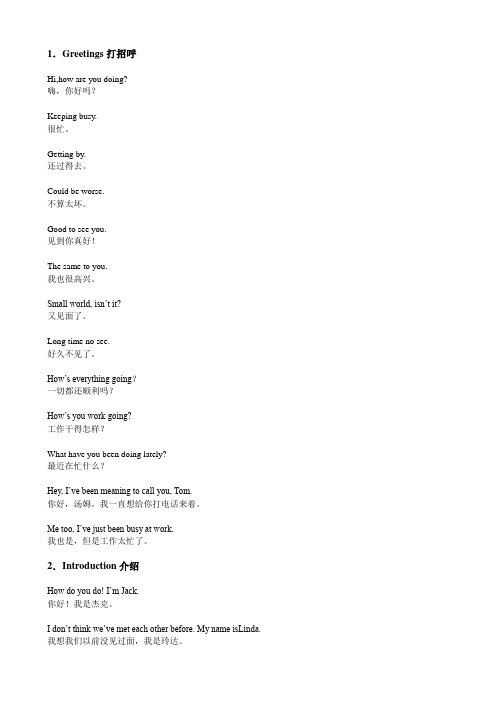
1.Greetings打招呼Hi,how are you doing?嗨,你好吗?Keeping busy.很忙。
Getting by.还过得去。
Could be worse.不算太坏。
Good to see you.见到你真好!The same to you.我也很高兴。
Small world, isn’t it?又见面了。
Long time no see.好久不见了。
How’s everything going?一切都还顺利吗?How’s you work going?工作干得怎样?What have you been doing lately?最近在忙什么?Hey, I’ve been meaning to call you, Tom.你好,汤姆。
我一直想给你打电话来着。
Me too, I’ve just been busy at work.我也是,但是工作太忙了。
2.Introduction介绍How do you do! I’m Jack.你好!我是杰克。
I don’t think we’ve met each other before. My name isLinda.I work for IT Company.我在IT公司工作。
I’m here to meet you on behalf of our company.我代表我们公司前来欢迎你们。
She’s a personal assistant to the general manager.她是总经理的私人助理。
May I introduceMr Wang to you?我可以为你介绍王先生吗?I wonder if you would introduce me toMiss Li?你能把我介绍给李小姐吗?May I have your name?请问尊姓大名?MrLiu, I suppose?您就是刘先生吗?Please call me Mark.叫我马克就行。
外企上班族常用英语对话十句

1. In the middle of something?正在忙吗?我知道有许多许多的⼈, 对于某⼀种概念学会了⼀种说法之后, 从此就只会⽤这种说法. 例如‘你在忙吗?’这个句⼦, 很多⼈在国中起就知道要说, "Are you busy?" 讲到了来美国留学三年, 他还是只会说 "Are you busy?". 其实有时候我们的眼界要放⼴⼀点,对于同⼀个概念要有不同的变化. 就像是 "Are you busy?" 这句话, 其实⽼美也很常⽤ "In the middle of something?" , (但这句话⽐较接近于 "Are you busy right now?" 是问⼈家‘现在’是不是正在忙? "Are you busy?" 的含意⽐较⼴, 也可指‘最近’忙不忙?) ⼤家不要⼩看这么⼩⼩的变化, 如果你除了 "Are you busy?" 之外, 有时还懂得刻意去⽤ "In the middle of something?" 我相信你的的英⽂说出来就会跟别⼈不⼀样. 举个例⼦吧, 办公室⾥想找⼈⼋卦, ⼜怕⼈家正在忙, 这时你就可以问他, "In the middle of something?" (正在忙吗?)记得在不久之前看过的⼀部⿊⼈电影 Down to Earth 中也有 in the middle of something 这个⽤法, 只不过男主⾓是⽤这句话来提出⼀个论点, "The first kiss is always in the middle of something." 也就是说, 初吻总是发⽣在讲话讲到⼀半时, 或是当你们正在作其它的事情时, 通常是果不其然的. 他同时也觉得, "The first kiss is the only real kiss in your relationship." (只有初吻才是真正的吻), "The others are just protocols" (其它的都只是⼀种敷衍、虚应故事⽽已.)2. What are you up to?你正在作什么?跟上⾯的例⼦⼀样, ‘你正在作什么啊?’这句话通常我们就只会说, "What are you doing?" 这样⼦不会很⽆聊吗? 其实有时我们可以换句话说. 例如: "What are you up to?" 同样也是问⼈家你正在作什么. 承上例, 假设你在办公室⾥, 你想找⼈⼋卦, 所以问同事, "In the middle of something?" 他回答, "Kind of." (算是吧.) 这时你就可以打破砂锅问到底, "What are you up to?" (那你最近在忙什么啊?) 另外有时候⽼美见⾯时也会问 "What are you up to?" 意思就是问你最近在作什么啊? 跟另⼀句问候语 "What's up?" 意思上很接近. 但是你要听对⽅的语⽓喔! 有时候 "What are you up to?" 指的虽然还是 "What are you doing?" 但它却是‘你在搞什么⿁啊?’的意思喔! 例如当你看到别⼈在乱翻你的东西, 你就可以责问他, "Hey, what are you up to?" 也就是骂他‘你在搞什么⿁啊?’. 或是像电影 Blow ⾥毒贩的⽼爸骂他的⼉⼦, "I know what you are up to." (我知道你在⼲些什么勾当.) 以上这些例⼦⾥, "What are you up to?" 完全可以⽤ "What are you doing?" 来取代, 只不过因为我们在说话时要⼒求变化, 所以要多学⼏种不同的讲法.其实 "What are you up to?" 还有许多其它的意思, 在此不⼀⼀列举, 不过还有⼀个⽐较常⽤的解释是, ‘进展的如何了?’例如朋友告诉你他正在写⼀部武侠⼩说, (就像我的 labmate ⼀样), 你就可以问他, "What are you up to?" (进展的如何了), ⽽他的回答可能是, "I am writing Chapter 3 now." 我现在正在写第三章呢.3. Can you just give me a ballpark figure?能不能给我⼀个⼤概的数字.Ballpark 指的是专供球类⽐赛的公园, 特别是指⼤型的棒球场. 例如亚特兰⼤勇⼠队 (Atlanta Braves) 的主场, Turner Field 就是⼀个 ballpark. 那什么是 ballpark figure 呢? 通常在棒球⽐赛时不是都会报今天的观众⼈数, 例如是 49,132 ⼈吗? 这个数字49,132 就是 ballpark figure, 但这只是⼀个⼤约的估计数字⽽已, 所以 ballpark figure 的意思就是指⼤约的估计数字. 所以在公司⾥如果⽼板问会计, 上个⽉⽔电费总共多少钱? 之后再加上⼀句, "Just give me a ballpark figure." 意思就是我只要⼀个⼤略的数字就⾏了. 甚⾄有些⽼美懒到就只说 ballpark, 所以⽼板也有可能会说, "I'll need a ballpark of the revenue last year." (我需要去年的营收的⼤约数字.) 你就要⾃⼰知道这个 ballpark 是 ballpark figure 的意思.其实很多像 ballpark 这种有点俚语的讲法, 你去问美国⼈, 我保证他们百分之九⼗九点九都知道 ballpark 的意思. 但是有很多外国⼈, 不管他们的英语再流利, 不管在美国住多久, 却还是常常会有听不懂的状况. 像⼩笨霖的指导教授是欧洲⼈, 但在美国也待超过⼗年了, 英语的流利⾃然是不在话下. 可是呢? 有⼀次我跟她说 "I can only give you a ballpark." 她却问我 ballpark 是什么意思. 我讲这个⼩故事给各位听的原因, 就是告诉你们拿这种俚语去跟美国⼈交谈, 通常是没问题的, 但是如果去跟英语同样也很流利的⽼印, ABC, 或是在美国住了很久的外国⼈, 则不保证他们能听得懂.4. Bottom line: We have to turn into profit by 2002.最重要的是: 我们必须在 2002 年前转亏为盈.⼤家看过财务报表没? 上⾯是⼀⼤堆密密⿇⿇的数字, 告诉你公司的资产有多少, 折旧多少, 应收帐款多少. 但是这些都不是最重要的, 最重要的在最最下⾯那⼀⾏ (bottom line), 叫净赚 (Net earnings) 告诉你这家公司总共加起来到底是赚钱还是赔钱, (这其实才是最重要的, 不是吗?) 所以 bottom line 这个字后来就变成了有‘最重要的是...’的意思. 例如商场上有句名⾔, "In business, If you don't take care of your customers, somebody else will. And that is the bottom line." (如果你不关⼼你的顾客的话, 其它的⼈会, 这是最重要的原则. ) 另外 bottom line 也有‘最后的底限’,‘不能再退让的原则’的意思. 例如⽼板可以告诫员⼯, "Bottom line: We have to ship this order by Friday." (我最后的底限是, 我们必须在星期五前运交这批货. )5. The new CFO was sent to bring the company out of the red.这位新的财务长被派来把公司从⾚字中拯救出来.中国⼈喜欢红⾊, 所以股市⼤涨时盘⾯上都是红通通的⼀⽚. 不过欧美国家对红⾊的认知则⼤不相同, 红⾊就表⽰亏损, ⾚字. 像之前提到的 bottom line 如果是⽤红笔写的, 那就是表⽰公司整体上来说是赔钱的. 相反的如果是⽤⿊笔写的, 则表⽰是赚钱的.所以我们常可以听到 in the red 或是 in the black 这样的讲法, 其实就是指公司赚不赚钱. 当然啦, 我们也可以⽤最简单的讲法, lose money 和 make money 或是形容词 unprofitable 和 profitable来表⽰赔钱或赚钱. 例如这家公司是赚钱的, 你可以说, "This company is in the black.", "The comapny is making money." 或是 "The company is profitable." 都可以.讲到这个 profitable 让我不得不提醒⼤家 non-profit 这个字, 因为常常有⼈会搞错. Non-profit 这个字指的并不是说不赚钱的, ⽽是说‘⾮营利性质的’, 例如像消费者⽂教基⾦会我们就可以说他是⼀个 non-profit organization, ⾮营利机构, 这种组织就不是以赚钱为⽬的. 但 nonprofitable 的话则是指不赚钱的就等于 unprofitable 或是 non-profit-making.6. Shelly just called in sick.Shelly 刚打电话来请病假.Call in sick 是⼀个在办公室内常会⽤到的⽚语, 指的是有⼈打电话来说他⽣病了不能来上班. 有兴趣听⽼美讲这句话的⼈不妨去看 "What Women Want?" (男⼈百分百) 这部电影, 我记得他们就有⽤ "call in sick" 这个⽚语. 当然啦, 这种事想也知道⼀定有相当的⽐例是偷懒⽽不想来上班⽽已, 不然就是员⼯找借⼝集体罢⼯, 例如 "Some workers called in sick to have a strike." (有些⼯⼈藉由集体打电话请病假来罢⼯.)那如果是正常的请病假 (sick leave/ medical leave) 要怎么讲? 你可以说, "I need a sick leave for two days." (我需要请两天病假.) 或是如果是因为⽼婆要分娩了, 想要请事假 (personal leave), 你可以说, "I'm asking for a three-day paid/unpaid personal leave for my wife's labor." (因为我⽼婆要⽣了, 我想要请三天假.) ⾄于这个假是扣不扣钱? (paid/unpaid) 就看公司的政策⽽定了.7. I just heard that seven people are going be laid off next month.我刚听到公司下个⽉要裁七位员⼯.最近失业率不断上升, 我也就顺便来谈谈裁员的话题. 公司要裁员的讲法有许多种, 其中最常见的不外是 layoff 这个字 (如果分开来写: lay off 是动词, 但合起来写 layoff 则是名词) . 例如, "Cisco issues a profit warning, plans layoffs." (思科发布盈余警讯, 计划裁员.) 当然还可以⽤⽐较⼝语的讲法说, cut jobs 或是 slash jobs, 例如上⼀句我们也可以说, "Cisco plans to cut/slash jobs." (思科计划裁员.) 据路边马路消息说, 由于 layoff 最近在英语中的出现频率排名⼤幅成长, layoff 这个字将会被收录在最新的英⽂常⽤ 3000 字汇当中. ^__^要是真的不幸在美国被裁员了怎么办? 先记住两句话再说, 第⼀句是, "Whose decision was this?" (这是谁的决定.) 俗语说冤有头债有主, 先问清楚了是谁动你的, 将来要把汽车轮胎放⽓才知道要放哪⼀台. 另⼀句话就是, "I am between jobs." 这句话在找新⼯作时很好⽤. ⼈家问你现在在作什么, 你不要呆呆地说, "I just got laid off." 多难听啊! 你应该说, "I am between jobs." 我正好在两个⼯作间的空档. 听起来⽐较委婉这可是之前刚被裁了员的好友 Joseph 教我的, 他就因为很会讲这句 "I am between jobs." ⽬前已经在德州休⼠顿找到新⼯作了. :D8. He suggested we should go to eat after my graveyard shift.他建议说我们可以在我的⼤夜班之后⼀起去吃东西.轮班这个字在英⽂⾥叫 shift, 例如三班制就叫 three shifts. 例如, "We have to work in three shifts to keep the company running." (我们必须轮三班制来保持⼯⼚的运转.) 我想⼤家都知道三班制就是⽇夜, ⼩夜班和⼤夜班. 在英⽂⾥⽇班就是 day shift 或是 regular shift, ⼩夜班是 night shift. 那⼤夜班呢? 有⼀个很有趣的讲法, 叫 graveyard shift. 所以如果你要说明⾃⼰上的是⼤夜班, 就可以这样说, "I work on the graveyard shift."⾄于为什么叫 graveyard shift 呢? 其中有⼀个⼴为流传的故事是这么说的, 在⼗九世纪时, ⼈们有时候会不⼩⼼把还活着的⼈当成死⼈埋掉. 为了避免这种悲剧发⽣, 所以他们在每个棺材⾥都装上电铃, 以便让这些意外醒来的‘⼫体’能够按铃求救. 也因此必须另外安排⼀位仁兄晚上时在墓地 (graveyard) ⾥巡查, 以便有⼈按铃时能即时通知家属. 所以⼤夜班后来就以此得名, 成为了graveyard shift. ⾄于你相不相信这种传说呢? 就看你⾃⼰了!9. I am only a regular 9-to-5er.我只是⼀个平凡的朝九晚五上班族.我相信中⽂的‘朝九晚五’这个字应该就是从英⽂ 9-to-5 这个字直接翻过来的吧? 由于上班族的⼯作时间多半都是很固定从早上九点到晚上五点, 所以才有 9-to-5 这个⽤法, 指的就是很⼀般上下班的⼯作. 记得有⼀次跟⼀个在社会上⼰经⼯作多年⼜回来念研究所的⽼美聊到他回学校念书的动机, 他就告诉我, "I don't want to work 9 to 5 for the rest of my life." (我不想⼀辈⼦都作朝九晚五的⼯作.) 另外像这种上班族也可以⾃称是⼀个 9-to-5er, 也就是指作这种朝九晚五⼯作的上班族. 但是像⼩笨霖我呢? 我就该⾃称是 10-to-3er 了. (我当然没那么认真凌晨三点回家, ⽽是下午三点就回家睡午觉了!)10. I refuse to work overtime during the weekend.我拒绝在周末时加班.英⽂⾥加班叫 work overtime. 例如别⼈喊你今晚出去吃饭, 你说, "Sorry, I have to work overtime." 就是告诉他, 很抱歉, 我今晚要加班. 不过有趣的是, 除了‘加班’可以叫 overtime, 加班费也可以叫 overtime. 例如你可以⼤声地告诉⽼板, "You have to pay me overtime!" (你必须要付我加班费.) 不过现在时机⽍⽍, 我看还是⼩声讲就好了.除了这个 pay overtime 之外, ⽼美也常⽤到另外两个字, ⼀个叫 double time, 另⼀个叫 time and one-half. Double time 指的是双倍的⼯资, ⽽ time and one-half 或是 time and a half 则是指⼀倍半的⼯资. 例如⽼板叫你作⼀些额外的⼯作, 你可以说, "If you pay me double time, I'll do it." (如果你付我双倍的⼯资, 我就去做.) 再造⼀句, "I like to work on holidays because I am on time and a half." (我喜欢在假⽇时⼯作, 因为这时的⼯资算⼀倍半.)。
老外最爱说的工作英语
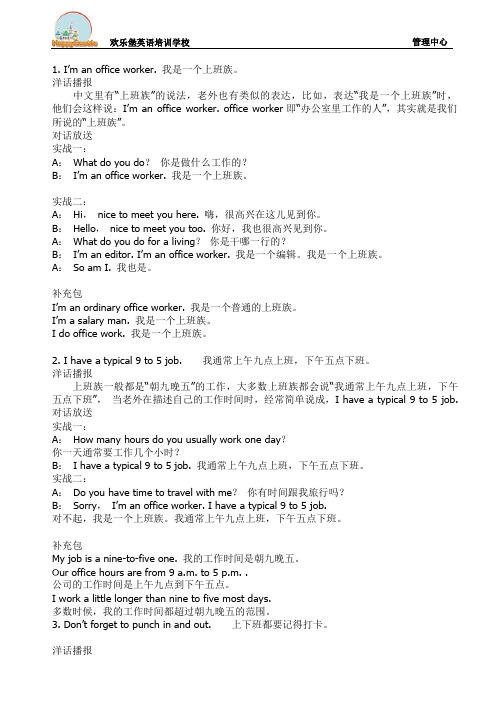
1.I’m an office worker. 我是一个上班族。
洋话播报中文里有“上班族”的说法,老外也有类似的表达,比如,表达“我是一个上班族”时,他们会这样说:I’m an office worker. office worker即“办公室里工作的人”,其实就是我们所说的“上班族”。
对话放送实战一:A:What do you do?你是做什么工作的?B:I’m an office worker. 我是一个上班族。
实战二:A:Hi,nice to meet you here. 嗨,很高兴在这儿见到你。
B:Hello,nice to meet you too. 你好,我也很高兴见到你。
A:What do you do for a living?你是干哪一行的?B:I’m an editor.I’m an office worker. 我是一个编辑。
我是一个上班族。
A:So am I. 我也是。
补充包I’m an ordinary office worker. 我是一个普通的上班族。
I’m a salary man. 我是一个上班族。
I do office work. 我是一个上班族。
2.I have a typical 9 to5job.我通常上午九点上班,下午五点下班。
洋话播报上班族一般都是“朝九晚五”的工作,大多数上班族都会说“我通常上午九点上班,下午五点下班”,当老外在描述自己的工作时间时,经常简单说成,I have a typical9to 5job.对话放送实战一:A:How many hours do you usually work one day?你一天通常要工作几个小时?B:I have a typical9 to5job. 我通常上午九点上班,下午五点下班。
实战二:A:Do you have time to travel with me?你有时间跟我旅行吗?B:Sorry,I’m an office worker.I have a typical9to5 job.对不起,我是一个上班族。
100句外资公司最实用地道英语口语

100 Useful and Authentic Business English Phrases for Foreign-Invested Companies"Good morning/afternoon, how can I assist you today?""Could you please elaborate on that?""I appreciate your feedback.""We value our partnership with you.""I'm sorry to hear that, let's find a solution together.""Could you provide more details on the project timeline?""Thank you for your prompt response.""We strive for excellence in everything we do.""I'm confident we can meet your expectations.""Could you confirm the details of our meeting?""We appreciate your business partnership.""I'm available for a discussion whenever you're ready.""Could you please clarify your request?""We take pride in our commitment to quality.""Thank you for your support and trust.""Could you share your thoughts on this matter?""We strive to deliver results beyond expectations.""I'm sorry for the inconvenience, we'll address it immediately.""Could you please provide an update on the project's progress?""We value your input and suggestions."(Continuing with the list...)"We're committed to delivering innovative solutions.""Could you confirm the details of the contract?""Thank you for your understanding during this difficult time.""We always aim to exceed customer satisfaction.""I'm here to help, how can I assist you?""Could you please review the attached documents?""We're dedicated to providing exceptional service.""Thank you for your patience while we resolve this issue.""Could you please confirm the meeting's agenda?""We appreciate your feedback on our products/services."(And so on, until reaching 100 phrases...)These phrases cover a wide range of common business situations and interactions, from greeting customers and colleagues, to discussing project details, handling issues, and expressing gratitude and appreciation. They are designed to help foreign-invested companies communicate effectively and professionally in English.。
外企简单工作英语口语

外企简单工作英语口语一、上班第一天的简单的英语口语对话A: Hello. Welcome to C&C Company你好。
欢迎你到C&C公司来。
B:Hello. And Good morning. I’m George Chen.你好,早上好。
我是乔治·陈。
A:Nice to meet you George. I’m glad you’ll be working for us. We’re like a big family here. We all work togetheras a team.乔治,很高兴见到你,我很高兴你能到我们这里来工作,我们这就像是一个大家庭,所有的人工作在一起,就像一个团队B:That’s great. I’m eager to start.太好了。
我都等不及要开始工作了A: Well, let me tell you about some of our policies and practices here.好的,那我就把这里的规章制度先跟你说一下。
B: All right. That will be a big help. I’m fresh out of college.好的。
那会对我协助很大。
我刚从学校毕业。
A: We requite all our employees to arrive for work ontime and we insist that they keep their lunch hours to a reasonable length.我们要求员工准时到岗,而且午餐的时间不要过长B: I understand. That seems easy to follow.我明白,这很容易做到。
A: Employee character is very important to us. We expect everyone here at C&C to be industrious, cooperative, honest and open-minded.员工性格很重要。
外企办公室常用的接电话口语.
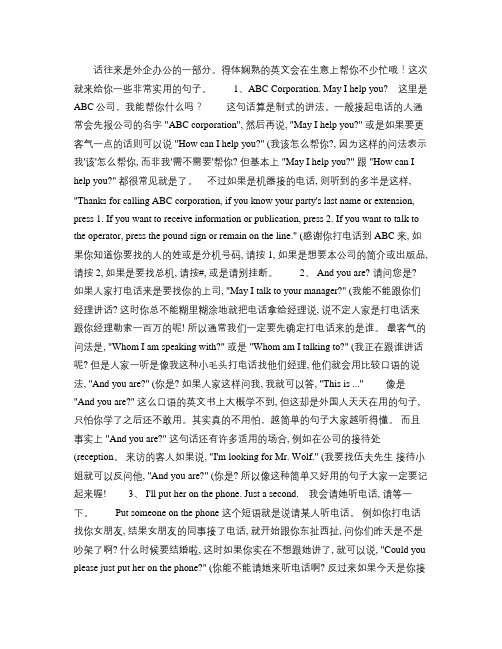
话往来是外企办公的一部分。
得体娴熟的英文会在生意上帮你不少忙哦!这次就来给你一些非常实用的句子。
1、ABC Corporation. May I help you?这里是ABC公司,我能帮你什么吗?这句话算是制式的讲法。
一般接起电话的人通常会先报公司的名字 "ABC corporation", 然后再说, "May I help you?" 或是如果要更客气一点的话则可以说 "How can I help you?" (我该怎么帮你?, 因为这样的问法表示我'该'怎么帮你, 而非我'需不需要'帮你? 但基本上 "May I help you?" 跟 "How can I help you?" 都很常见就是了。
不过如果是机器接的电话, 则听到的多半是这样, "Thanks for calling ABC corporation, if you know your party's last name or extension, press 1. If you want to receive information or publication, press 2. If you want to talk to the operator, press the pound sign or remain on the line." (感谢你打电话到 ABC 来, 如果你知道你要找的人的姓或是分机号码, 请按1, 如果是想要本公司的简介或出版品, 请按2, 如果是要找总机, 请按#, 或是请别挂断。
2、 And you are? 请问您是?如果人家打电话来是要找你的上司, "May I talk to your manager?" (我能不能跟你们经理讲话? 这时你总不能糊里糊涂地就把电话拿给经理说, 说不定人家是打电话来跟你经理勒索一百万的呢! 所以通常我们一定要先确定打电话来的是谁。
外企常用英语口语大全

外企常用英语口语大全.txt男人的话就像老太太的牙齿,有多少是真的?!问:你喜欢我哪一点?答:我喜欢你离我远一点!执子之手,方知子丑,泪流满面,子不走我走。
诸葛亮出山前,也没带过兵!凭啥我就要工作经验?这些句子简单却很有用,你都会表达吗?1. I see.我明白了。
2. I quit! 我不干了!3. Let go! 放手!4. Me too.我也是。
5. My god! 天哪!6. No way! 不行!7. Come on.来吧(赶快)8. Hold on.等一等。
9. I agree。
我同意。
10. Not bad.还不错。
11. Not yet.还没。
12. See you.再见。
13. Shut up! 闭嘴!14. So long.再见。
15. Why not? 好呀! (为什么不呢?)16. Allow me.让我来。
17. Be quiet! 安静点!18. Cheer up! 振作起来!19. Good job! 做得好!20. Have fun! 玩得开心!21. How much? 多少钱?22. I"m full.我饱了。
23. I"m home.我回来了。
24. I"m lost.我迷路了。
25. My treat.我请客。
26. So do I.我也一样。
27. This way。
这边请。
28. After you.您先。
29. Bless you! 祝福你!30. Follow me.跟我来。
31. Forget it! 休想! (算了!)32. Good luck! 祝好运!33. I decline! 我拒绝!34. I promise.我保证。
35. Of course! 当然了!36. Slow down! 慢点!37. Take care! 保重!38. They hurt. (伤口)疼。
39. Try again.再试试。
40. Watch out! 当心。
外企职场英语口语常用句型

外企职场英语口语常用句型外企职场英语口语常用句型你知道外企职场都有哪些英语口语吗?你对外企职场常用英语口语了解吗?下面是yjbys店铺为大家带来的外企职场英语口语常用句型的知识,欢迎阅读。
外企职场英语口语常用句型赶上了!I made it! *可以用于上班、上学和坐车时的情况。
I made it! (我赶上了!)Not quite. (那可未必。
)I'm on time!I arrived on time! (正点到达。
)要严格遵守时间。
Be punctual!Be punctual! (要严格遵守时间。
)Yes, sir.(是,知道了。
)你又迟到了。
You are late again.我只迟到了5分钟。
I was only late by five minutes.I was only five minutes late.打出勤卡了吗?Did you punch in? *上班时。
Did you punch out? *下班时。
让我看看我的日程安排。
Let me check my schedule.Can we meet on Tuesday? (星期二我们可以见面吗?)Let me check my schedule. (让我看看我的日程安排。
)Let me look over my schedule.Let me confirm my schedule.我有好多事要干。
I've got so much to do.I've got so much to do. (我有好多事要干。
)Don't worry. You can do it. (不用担心,你完全能干好!)I have so much to do.I have many things to do.I'm extremely busy. (我非常忙。
)我的时间安排很紧。
I'm pressed for time.我是个普通的公司职员。
外企常用英语
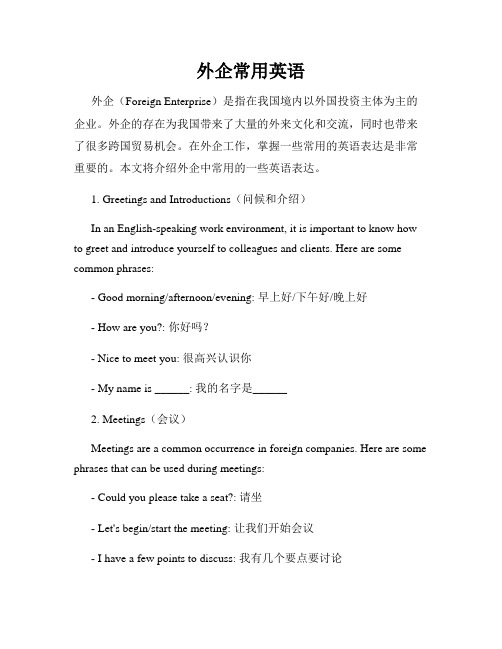
外企常用英语外企(Foreign Enterprise)是指在我国境内以外国投资主体为主的企业。
外企的存在为我国带来了大量的外来文化和交流,同时也带来了很多跨国贸易机会。
在外企工作,掌握一些常用的英语表达是非常重要的。
本文将介绍外企中常用的一些英语表达。
1. Greetings and Introductions(问候和介绍)In an English-speaking work environment, it is important to know how to greet and introduce yourself to colleagues and clients. Here are some common phrases:- Good morning/afternoon/evening: 早上好/下午好/晚上好- How are you?: 你好吗?- Nice to meet you: 很高兴认识你- My name is ______: 我的名字是______2. Meetings(会议)Meetings are a common occurrence in foreign companies. Here are some phrases that can be used during meetings:- Could you please take a seat?: 请坐- Let's begin/start the meeting: 让我们开始会议- I have a few points to discuss: 我有几个要点要讨论- Can you elaborate on that?: 你能详细说明一下吗?3. Presentations(演示)Presentations are often used to share information and ideas in a professional setting. Here are some phrases that can be helpful during presentations:- Today, I would like to talk about...: 今天,我想谈谈...- Let me start by giving you some background information: 让我先介绍一下背景信息- As you can see on the screen: 正如你们在屏幕上看到的- Do you have any questions so far?: 到目前为止,你们有什么问题吗?4. Email Correspondence(邮件往来)Email is a common form of communication in foreign companies. Here are some useful phrases for writing professional emails:- Dear Mr./Ms. ______: 亲爱的______先生/女士- I am writing to inquire about...: 我写信是想了解...- Thank you for your prompt reply: 感谢您的及时回复- Please find attached the document you requested: 请查收您需要的文件5. Networking(社交)Networking is an important aspect of working in a foreign company. Here are some phrases that can be used during social interactions:- What do you do for a living?: 你从事什么职业?- Are you attending the conference next week?: 你下周会参加这个会议吗?- It was nice talking to you: 很高兴和你交谈- Let's stay in touch: 让我们保持联系6. Apologies and Requests(道歉和请求)Sometimes, it may be necessary to apologize or make a request in a professional setting. Here are some phrases that can be used:- I apologize for the inconvenience caused: 对给您带来的不便表示道歉- Could you please send me the report by tomorrow?: 你能否在明天之前将报告发给我?- I would appreciate it if you could help me with this matter: 如果您能帮我处理这个事情,我将不胜感激- Thank you for your assistance: 感谢您的帮助总结:以上是外企常用的一些英语表达。
外企常用英语口语单词

外企常用英语口语单词在外企工作,除了熟练掌握英语语法和词汇外,还需要了解一些常用的英语口语单词,这些单词通常用于日常工作交流中,能让你显得更加地道和流利。
以下是一些外企常用的英语口语单词,帮助您在职场中更加得心应手。
1. Meeting:•Agenda - 议程•Minutes - 会议记录•Chairperson - 主持人•Action items - 行动项目2. Email communication:•Attachment - 附件•CC (Carbon Copy) - 抄送•BCC (Blind Carbon Copy) - 密送•Reply All - 全部回复3. Business:•Client - 客户•Vendor - 供应商•ROI (Return on Investment) - 投资回报率•PO (Purchase Order) - 采购订单4. Department:•HR (Human Resources) - 人力资源•IT (Information Technology) - 信息技术•R&D (Research and Development) - 研发部•Sales - 销售部5. Communication:•Follow up - 跟进•Feedback - 反馈•Conference call - 电话会议•Memo - 内部通知6. Project management:•Milestone - 里程碑•Deliverables - 交付成果•Timeline - 时间表•Scrum - 快速迭代开发7. Professional skills:•Multitasking - 多任务处理•Networking - 社交关系拓展•Time management - 时间管理•Presentation - 演讲技能8. Business travel:•Itinerary - 日程安排•Visa - 签证•Expense report - 报销单•Jet lag - 时差反应9. Office equipment and software:•Printer - 打印机•Scanner - 扫描仪•VPN (Virtual Private Network) - 虚拟专用网络•CRM (Customer Relationship Management) - 客户关系管理软件10. Social interactions:•Small talk - 闲聊•Team building - 团队建设•Happy hour - 欢乐时光•Networking event - 社交活动结语以上是一些在外企工作中常用的英语口语单词,掌握这些单词将有助于提升您在职场中的交流效率和表达能力。
超全整理外企常用英文
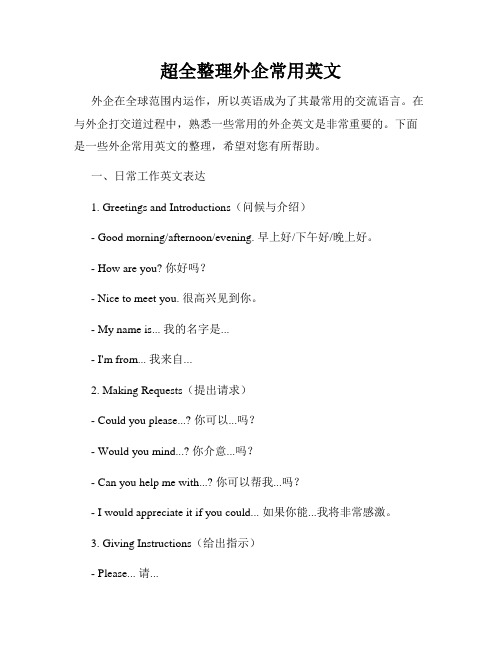
超全整理外企常用英文外企在全球范围内运作,所以英语成为了其最常用的交流语言。
在与外企打交道过程中,熟悉一些常用的外企英文是非常重要的。
下面是一些外企常用英文的整理,希望对您有所帮助。
一、日常工作英文表达1. Greetings and Introductions(问候与介绍)- Good morning/afternoon/evening. 早上好/下午好/晚上好。
- How are you? 你好吗?- Nice to meet you. 很高兴见到你。
- My name is... 我的名字是...- I'm from... 我来自...2. Making Requests(提出请求)- Could you please...? 你可以...吗?- Would you mind...? 你介意...吗?- Can you help me with...? 你可以帮我...吗?- I would appreciate it if you could... 如果你能...我将非常感激。
3. Giving Instructions(给出指示)- Please... 请...- Make sure to... 确保...- Remember to... 记住...- Don't forget to... 不要忘记...4. Meeting and Conference Calls(会议与电话会议)- I'd like to call this meeting to order. 我想召开这次会议。
- Let's move on to the next agenda item. 我们继续下一个议程。
- Can everyone hear me clearly? 大家都能听得清楚吗?- I'd like to invite [name] to present their report. 我想邀请[name]来介绍他们的报告。
外企英文
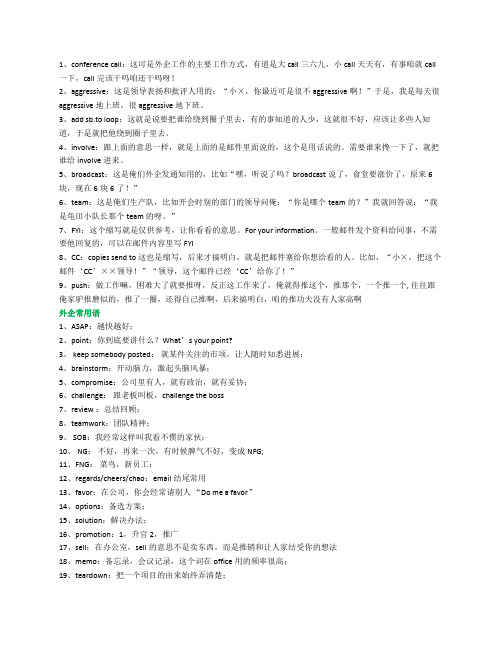
1、conference call:这可是外企工作的主要工作方式,有道是大call三六九,小call天天有,有事咱就call一下,call完该干吗咱还干吗呀!2、aggressive:这是领导表扬和批评人用的:“小×,你最近可是很不aggressive啊!”于是,我是每天很aggressive地上班,很aggressive地下班。
3、add sb.to loop:这就是说要把谁给绕到圈子里去,有的事知道的人少,这就很不好,应该让多些人知道,于是就把他绕到圈子里去。
4、involve:跟上面的意思一样,就是上面的是邮件里面说的,这个是用话说的。
需要谁来搀一下了,就把谁给involve进来。
5、broadcast:这是俺们外企发通知用的,比如“嘿,听说了吗?broadcast说了,食堂要涨价了,原来6块,现在6块6了!”6、team:这是俺们生产队,比如开会时别的部门的领导问俺:“你是哪个team的?”我就回答说:“我是龟田小队长那个team的呀。
”7、FYI:这个缩写就是仅供参考,让你看看的意思。
For your information。
一般邮件发个资料给同事,不需要他回复的,可以在邮件内容里写FYI8、CC:copies send to 这也是缩写,后来才搞明白,就是把邮件塞给你想给看的人。
比如,“小×,把这个邮件‘CC’××领导!”“领导,这个邮件已经‘CC’给你了!”9、push:做工作嘛,困难大了就要推呀,反正这工作来了,俺就得推这个,推那个,一个推一个,往往跟俺家驴推磨似的,推了一圈,还得自己推啊,后来搞明白,咱的推功夫没有人家高啊外企常用语1、ASAP:越快越好;2、point:你到底要讲什么?What’s your point?3、 keep somebody posted:就某件关注的市项,让人随时知悉进展;4、brainstorm:开动脑力,激起头脑风暴;5、compromise:公司里有人,就有政治,就有妥协;6、challenge:跟老板叫板,challenge the boss7、review :总结回顾;8、teamwork:团队精神;9、 SOB:我经常这样叫我看不惯的家伙;10、 NG:不好,再来一次,有时候脾气不好,变成NFG;11、FNG:菜鸟,新员工;12、regards/cheers/chao:email结尾常用13、favor:在公司,你会经常请别人“Do me a favor”14、options:备选方案;15、solution:解决办法;16、promotion:1,升官 2,推广17、sell:在办公室,sell的意思不是卖东西,而是推销和让人家结受你的想法18、memo:备忘录,会议记录,这个词在office用的频率很高;19、teardown:把一个项目的由来始终弄清楚;20、hantch:灵机一动的想法21、OT:“小丽,今晚OT晚回。
外企里最常用的15句英语表达

8、Unacceptable
• 字面意思是:不能接受。老外从小接受的 教育是人要以表扬鼓励为主,所以老外批 评人比较含蓄。说你这件事办的 unacceptable,已经算是说的很重了,就是 指你办的事情太差了,说不过去啊。中国 老板在外企混久了,也便跟着拽起来,对 你不满,写email给你,左一个 unacceptable右一个unacceptable。 • 潜台词:你办的这是什么事啊,太不 合我心意了,最好小心点。
6、Involve
• 字面翻译成“介入”。一件事情,在外企 involve的老板越高层,事情就越复杂, Director(总监)要是involve了,那 Manager(经理)就开始紧张;VP(副总裁)要 是involve了,那整个部门相关人员都别想 有好日子过,得加班加得四脚朝天。 • 潜台词:大佬很生气,后果很严重。
11、Follow up
12、To Do List
• 进入外企,如果你想有条不紊的完成手里面堆成 小山的工作,而且不会误了deadline的话,那你 的法宝就是To Do List。一定要做一个很有条理的 Excel 表格,把项目的名称、期限、具体内容、 特别注意、进展情况等都列成一个表,随时follow up自己的进度。这样,不仅能让自己变得有条理, 而且在老板问起来的时候也好有个实实在在的东 西给她/他看。同时,这也是日后写绩效评估的一 个文字依据啊,何乐而不为呢? • 潜台词:在外企可不能“光说不练”,只有 把该做的执行工作都写在清单里才能保质保量地 完成工作。
15、Performance Evaluation
• 意思是:(定期的)员工个人评定。有的外企是 一年做一次绩效评估,有的是每季度都要做, 程序是:员工先在评估表上自己打分、写评语, 然后由部门主管打分,两个人再一起沟通,并 且制定下一年或下一季度的行动计划。这个评 定在外企里非常重要,通过试用期需要评估, 升职前也需要评估。通过评估可以让上司看到 自己的成绩,也是和上司交流的一个好机会, 从而发现自己的不足和有待提高的地方。 • 潜台词:拿Performance Evaluation不当 回事的人,在外企绝对混不久的。
职场英语 外企办公室常用口语

职场英语外企办公室常用口语
office里常用的英语说法~不长的句子,但是很有用哦!
1. In the middle of something?正在忙吗?
2. What are you up to?你正在作什么?
3. Can you just give me a ballpark figure?能不能给我一个大概的数字.
4. Bottom line: We have to turn into profit by xx. 最重要的是: 我们必须在xx 年前转亏为盈.
5. The new CFO was sent to bring the pany out of the red. 这位新的财务长被派来把公司从赤字中出来.
外企office 英语
1. ABC corporation. May I help you? ABC 公司, 我能帮你什么吗?
2. And you are? 你是?
3. I’ll put her on the phone. Just a second.我会请她听 , 请等一下.
4. Would you mind holding for one minute?你介不介意稍微等一分钟啊?
5. He’s out for lunch. Would you like to try again an hour later?
他出去吃午餐了, 你要不要一小时后再打来?。
外企面试常用语
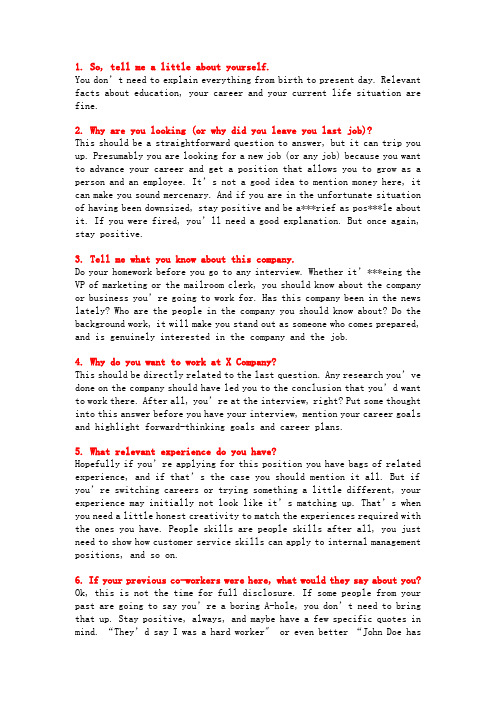
1. So, tell me a little about yourself.You don’t need to explain everything from birth to present day. Relevant facts about education, your career and your current life situation are fine.2. Why are you looking (or why did you leave you last job)?This should be a straightforward question to answer, but it can trip you up. Presumably you are looking for a new job (or any job) because you want to advance your career and get a position that allows you to grow as a person and an employee. It’s not a good ide a to mention money here, it can make you sound mercenary. And if you are in the unfortunate situation of having been downsized, stay positive and be a***rief as pos***le about it. If you were fired, you’ll need a good explanation. But once again, stay positive.3. Tell me what you know about this company.Do your homework before you go to any interview. Whether it’***eing the VP of marketing or the mailroom clerk, you should know about the company or business you’re going to work for. Has this company been in the news lately? Who are the people in the company you should know about? Do the background work, it will make you stand out as someone who comes prepared, and is genuinely interested in the company and the job.4. Why do you want to work at X Company?This should be directly related to the last question. Any research you’ve done on the company should have led you to the conclusion that you’d want to work there. After all, you’re at the interview, right? Put some thought into this answer before you have your interview, mention your career goals and highlight forward-thinking goals and career plans.5. What relevant experience do you have?Hopefully if you’re applying for this position you have bags of related experience, and if that’s the case you should mention it all. But if you’re switching careers or trying something a little different, your experience may initially not look like it’s matching up. That’s when you need a little honest creativity to match the experiences required with the ones you have. People skills are people skills after all, you just need to show how customer service skills can apply to internal management positions, and so on.6. If your previous co-workers were here, what would they say about you? Ok, this is not the time for full disclosure. If some people from your past are going to say you’re a boring A-hole, you don’t need to bring that up. Stay positive, always, and maybe have a few specific quotes in mind. “They’d say I was a hard worker〞or even better “John Doe hasalways said I was the most reliable, creative problem-solver he’d ever met.〞7. Have you done anything to further your experience?This could include anything from night classes to hobbies and sports. If it’s related, it’s worth mentioning. Obviously anything to do with further education is great, but maybe you’re spending time on a home improvement project to work on skills such as self-sufficiency, time management and motivation.8. Where else have you applied?This is a good way to hint that you’re in demand, wit hout sounding like you’re whoring yourself all over town. So, be honest and mention a few other companie***ut don’t go into detail. The fact that you’re seriously looking and keeping your options open is what the interviewer is driving at.9. How are you w hen you’re working under pressure?Once again, there are a few ways to answer thi***ut they should all be positive. You may work well under pressure, you may thrive under pressure, and you may actually PREFER working under pressure. If you say you crumble like aged blue cheese, this is not going to help you get your foot in the door.10. What motivates you to do a good job?The answer to this one is not money, even if it is. You should be motivated by life’s noble pursuits. You want recognition for a job we ll done. You want to become better at your job. You want to help others or be a leader in your field.11. What’s your greatest strength?This is your chance to shine. You’re being asked to explain why you are a great employee, so don’t hold back and stay d o stay positive. You could be someone who thrives under pressure, a great motivator, an amazing problem solver or someone with extraordinary attention to detail. If your greatest strength, however, is to drink anyone under the table or get a top score on Mario Kart, keep it to yourself. The interviewer is looking for work-related strengths.12. What’s your biggest weakness?If you’re completely honest, you may be kicking yourself in the butt. If you say you don’t have one, you’re obviously lying. This is a horrible question and one that politicians have become masters at answering. They say things like “I’m perhaps too committed to my work and don’t spend enough time with my family.〞Oh, there’s a fireable offense. I’ve evenheard “I think I’m too good at my job, it can often make people jealous.〞Please, let’s keep our feet on the ground. If you’re asked this question, give a small, work-related flaw that you’re working hard to improve. Example: “I’ve been told I occasionally focus on details and miss the bi gger picture, so I’ve been spending time laying out the complete project every day to see my overall progress.〞13. Let’s talk about salary. What are you looking for?Run for cover! This is one tricky game to play in an interview. Even if you know the sala ry range for the job, if you answer first you’re already showing all your cards. You want as much as pos***le, the employer wants you for as little as you’re willing to take. Before you apply, take a look at salary for a good idea of what someone with your specific experience should be paid. You may want to say, “well, that’s something I’ve thought long and hard about and I think someone with my experience should get between X & Y.〞Or, you could be sly and say, “right now, I’m more interested in talkin g more about what the position can offer my career.〞 That could at least buy you a little time to scope out the situation. But if you do have a specific figure in mind and you are confident that you can get it, I’d say go for it. I have on many occasions, and every time I got very close to that figure (both below and sometimes above).14. Are you good at working in a team?Unless you have the I.Q. of a houseplant, you’ll always answer YES to this one. It’s the only answer. How can anyone function inside an organization if they are a loner? You may want to mention what part you like to play in a team though; it’s a great chance to explain that you’re a natural leader.15. Tell me a suggestion you have made that was implemented.It’s important here to focus on the word “implemented.〞There’s nothing wrong with having a thousand great ideas, but if the only place they live is on your notepad what’s the point? Better still, you need a good ending. If your previous company took your advice and ended up going bankr upt, that’s not such a great example either. Be prepared with a story about an idea of yours that was taken from idea to implementation, and considered successful.16. Has anything ever irritated you about people you’ve worked with? Of course, you have a l ist as long as your arm. But you can’t say that, it shows you a***eing negative and difficult to work with. The best way to answer this one is to think for a while and then say something like “I’ve always got on just fine with my co-workers actually.〞Use this question as a chance to show that you are a team player: “The only people I have trouble with are those who aren’t team players, who just don’t perform, who complain constantly, and who fail to respond to any efforts to motivate them.〞 The interviewer is expecting a response focused on personality and personal dislikes. Surprise her by delivering an answer that reflects company values17. Is there anyone you just could not work with?No. Well, unless you’re talking about murderers, racists, rapists, thieves or other dastardly characters, you can work with anyone. Otherwise you could be flagged as someone who’s picky and difficult if you say, “I can’t work with anyone who’s a Bronco’s fan. Sorry.〞18. Tell me about any issues you’ve had with a previou***oss.Arrgh! If you fall for this one you shouldn’t be hired anyway. The interviewer is testing you to see if you’ll speak badly about your previous supervisor. Simply answer this question with exteme tact, diplomacy and if necessary, a big fat loss of memo ry. In short, you’ve never had any issues.The answer to 18 is completely wrong. I am a director at a major media company’s interactive division. Our company is expanding and I am almost in a constant state of hiring. I ask a variation of this question in every single interview and if a candidate has never had one issue or disagreement with anyone, (I stated a variation: I ask if it has happened with anyone in the workplace) I peg them as a liar and reject them immediately.I went well with my previou***oss. If there is an conflict, I will be open mind and talk about facts. once decision is made, I execute it well.19. Would you rather work for money or job satisfaction?It’s not a very fair question is it? We’d all love to get paid a Trump-like salary doing a job we love but that’s rare indeed. It’s fine to say money is important, but remember that NOTHING is more important to you than the job. Otherwise, you’re just someone looking for a bigger paycheck.20. Would you rather be liked or feared?I have been asked this a lot, in various incarnations. The first time I just drew a blank and said, “I don’t know.〞 That went over badly, but it was right at the start of my career when I had little to no experience. Since then I’ve realized that my genuine answer is “Neither, I’d rather be respected.〞You don’t want to be feared because fear is no way to motivate a team. You may got the job done but at what cost? Similarly, if you’re everyone’***est friend you’ll find it difficult to make toughdecisions or hit deadli nes. But when you’re respected, you don’t have to be a complete bastard or a lame duck to get the job done.21. Are you willing to put the interests of X Company ahead of your own? Again, another nasty question. If you say yes, you’re a corporate whore who doesn’t care about family. If you say no, you’re disloyal to the company. I’m afraid that you’ll probably have to say yes to this one though, because you’re trying to be the perfect employee at this point, and perfect employees don’t cut out early for Jimmy’***a***all game.it is situational. if you… ; if you …. Ethics and professionalism22. So, explain why I should hire you.As I’m sure you know, “because I’m great〞or “I really need a job〞are not good answers here. This is a time to give the employer a laundry list of your greatest talents that just so happen to match the job description. It’s also good to avoid taking potshots at other potential candidates here. Focus on yourself and your talents, not other people’s flaws.23. Finally, do you have any questions to ask me?I’ll finish the way I started, with one of the most common questions asked in interviews. This directly relates to the research you’ve done on the company and also gives you a chance to show how eager and prepared you are. You’ll probably want to ask about benefits if they haven’t been covered already. A good generic one is “how soon could I start, if I were offered the job of course.〞You may also ask what you’d be working on. Specifically, in the role you’re applying for and how tha t affects the rest of the company. Always have questions ready, greeting this one with a blank stare is a rotten way to finish your interview. Good luck and happy job hunting.ponder for a moment, and then ask your interviewer “what aspect of your job do you find most challenging〞.I would ask the interviewer, “Why do you like to work here?〞24. Where do you want to be in 5 to years?They dont want to hear in the same job you are interviewing for. Ultimately, the HR people are searching for someone who can handle the job now, and has the potential to grow into a high level management job in the future. Do you have those goals too?25. Would you rather work for a big company or a small one?Favorite answer: I’d treat any company like it was my own regardless. Total ownership of the situation can get you a long way.General , the worst answer was “I don’t know.〞I’ve since learned that “it depends,〞 with a couple of examples, is perfectly appropriate。
跟老外生意的日常用语
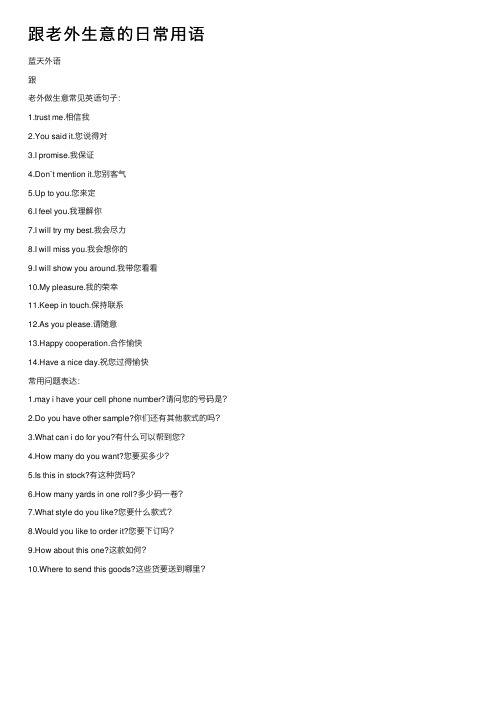
跟⽼外⽣意的⽇常⽤语
蓝天外语
跟
⽼外做⽣意常见英语句⼦:
1.trust me.相信我
2.You said it.您说得对
3.I promise.我保证
4.Don`t mention it.您别客⽓
5.Up to you.您来定
6.I feel you.我理解你
7.I will try my best.我会尽⼒
8.I will miss you.我会想你的
9.I will show you around.我带您看看
10.My pleasure.我的荣幸
11.Keep in touch.保持联系
12.As you please.请随意
13.Happy cooperation.合作愉快
14.Have a nice day.祝您过得愉快
常⽤问题表达:
1.may i have your cell phone number?请问您的号码是?
2.Do you have other sample?你们还有其他款式的吗?
3.What can i do for you?有什么可以帮到您?
4.How many do you want?您要买多少?
5.Is this in stock?有这种货吗?
6.How many yards in one roll?多少码⼀卷?
7.What style do you like?您要什么款式?
8.Would you like to order it?您要下订吗?
9.How about this one?这款如何?
10.Where to send this goods?这些货要送到哪⾥?。
Iknow是不礼貌的意思?在外企最常用的三个口头禅!
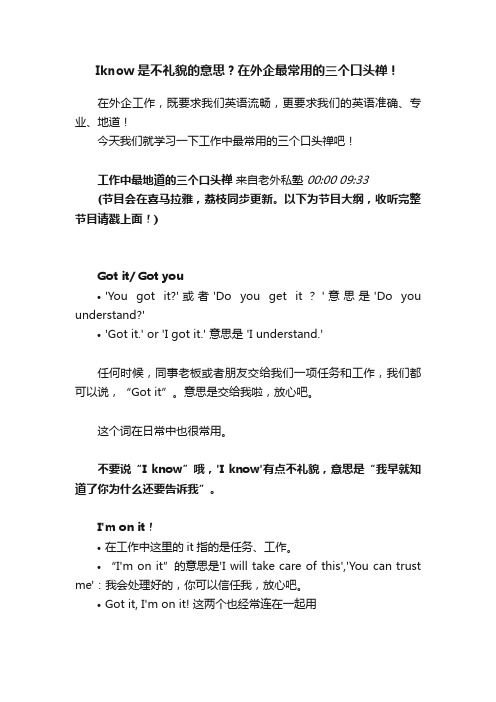
Iknow是不礼貌的意思?在外企最常用的三个口头禅!在外企工作,既要求我们英语流畅,更要求我们的英语准确、专业、地道!今天我们就学习一下工作中最常用的三个口头禅吧!工作中最地道的三个口头禅来自老外私塾00:0009:33(节目会在喜马拉雅,荔枝同步更新。
以下为节目大纲,收听完整节目请戳上面!)Got it/ Got you•'You got it?'或者'Do you get it?'意思是'Do you understand?'•'Got it.' or 'I got it.' 意思是 'I understand.'任何时候,同事老板或者朋友交给我们一项任务和工作,我们都可以说,“Got it”。
意思是交给我啦,放心吧。
这个词在日常中也很常用。
不要说“I know”哦,'I know'有点不礼貌,意思是“我早就知道了你为什么还要告诉我”。
I'm on it!•在工作中这里的it指的是任务、工作。
•“I'm on it”的意思是'I will take care of this','You can trust me':我会处理好的,你可以信任我,放心吧。
•Got it, I'm on it! 这两个也经常连在一起用run it by•“run something by somebody”意思是“tell (someone) about something”:告诉某人某事,从而得到某人的意见、允许- I have a new idea about the product, I will run it by the boss. 我对这个产品有一些新的想法,我会把这些告诉老板。
- Is tomorrow 2 o'clock a good time to meet? 明天两点我们可以会面吗?- Let me run it by the other departments. 让我征求一下其他部门的意见哦。
- 1、下载文档前请自行甄别文档内容的完整性,平台不提供额外的编辑、内容补充、找答案等附加服务。
- 2、"仅部分预览"的文档,不可在线预览部分如存在完整性等问题,可反馈申请退款(可完整预览的文档不适用该条件!)。
- 3、如文档侵犯您的权益,请联系客服反馈,我们会尽快为您处理(人工客服工作时间:9:00-18:30)。
外企office常用英语(一)1. In the middle of something?正在忙吗?我知道有许多许多的人, 对于某一种概念学会了一种说法之后, 从此就只会用这种说法. 例如…你在忙吗?‟这个句子, 很多人在国中起就知道要说, "Are you busy?" 讲到了来美国留学三年, 他还是只会说"Are you busy?". 其实有时候我们的眼界要放广一点, 对于同一个概念要有不同的变化. 就像是"Are you busy?" 这句话, 其实老美也很常用"In the middle of something?" , (但这句话比较接近于"Are you busy right now?" 是问人家…现在‟是不是正在忙? "Are you busy?" 的含意比较广, 也可指…最近‟忙不忙?) 大家不要小看这么小小的变化, 如果你除了"Are you busy?" 之外, 有时还懂得刻意去用"In the middle of something?" 我相信你的的英文说出来就会跟别人不一样. 举个例子吧, 办公室里想找人八卦, 又怕人家正在忙, 这时你就可以问他, "In the middle of something?" (正在忙吗?)记得在不久之前看过的一部黑人电影Down to Earth 中也有in the middle of something 这个用法, 只不过男主角是用这句话来提出一个论点, "The first kiss is always in the middle of something." 也就是说, 初吻总是发生在讲话讲到一半时, 或是当你们正在作其它的事情时, 通常是果不其然的. 他同时也觉得, "The first kiss is the only real kiss in your relationship." (只有初吻才是真正的吻), "The others are just protocols" (其它的都只是一种敷衍、虚应故事而已.)2. What are you up to?你正在作什么?跟上面的例子一样, …你正在作什么啊?‟这句话通常我们就只会说, "What are you doing?" 这样子不会很无聊吗? 其实有时我们可以换句话说. 例如: "What are you up to?" 同样也是问人家你正在作什么. 承上例, 假设你在办公室里, 你想找人八卦, 所以问同事, "In the middle of something?" 他回答, "Kind of." (算是吧.) 这时你就可以打破砂锅问到底, "What are you up to?" (那你最近在忙什么啊?) 另外有时候老美见面时也会问"What are you up to?" 意思就是问你最近在作什么啊? 跟另一句问候语"What‟s up?" 意思上很接近. 但是你要听对方的语气喔! 有时候"What are you up to?" 指的虽然还是"What are you doing?" 但它却是…你在搞什么鬼啊?‟的意思喔! 例如当你看到别人在乱翻你的东西, 你就可以责问他, "Hey, what are you up to?" 也就是骂他…你在搞什么鬼啊?‟. 或是像电影Blow 里毒贩的老爸骂他的儿子, "I know what you are up to." (我知道你在干些什么勾当.) 以上这些例子里, "What are you up to?" 完全可以用"What are you doing?" 来取代, 只不过因为我们在说话时要力求变化, 所以要多学几种不同的讲法.其实"What are you up to?" 还有许多其它的意思, 在此不一一列举, 不过还有一个比较常用的解释是, …进展的如何了?‟例如朋友告诉你他正在写一部武侠小说, (就像我的labmate 一样), 你就可以问他, "What are you up to?" (进展的如何了), 而他的回答可能是, "I am writing Chapter 3 now." 我现在正在写第三章呢.3. Can you just give me a ballpark figure?能不能给我一个大概的数字.Ballpark 指的是专供球类比赛的公园, 特别是指大型的棒球场. 例如亚特兰大勇士队(Atlanta Braves) 的主场, Turner Field 就是一个ballpark. 那什么是ballpark figure 呢? 通常在棒球比赛时不是都会报今天的观众人数, 例如是49,132 人吗? 这个数字49,132 就是ballpark figure, 但这只是一个大约的估计数字而已, 所以ballpark figure 的意思就是指大约的估计数字. 所以在公司里如果老板问会计, 上个月水电费总共多少钱? 之后再加上一句, "Just give me a ballpark figure." 意思就是我只要一个大略的数字就行了. 甚至有些老美懒到就只说ballpark, 所以老板也有可能会说, "I‟ll need a ballpark of the revenue last year." (我需要去年的营收的大约数字.) 你就要自己知道这个ballpark 是ballpark figure 的意思.其实很多像ballpark 这种有点俚语的讲法, 你去问美国人, 我保证他们百分之九十九点九都知道ballpark 的意思. 但是有很多外国人, 不管他们的英语再流利, 不管在美国住多久, 却还是常常会有听不懂的状况. 像小笨霖的指导教授是欧洲人, 但在美国也待超过十年了, 英语的流利自然是不在话下. 可是呢? 有一次我跟她说"I can only give you a ballpark." 她却问我ballpark 是什么意思. 我讲这个小故事给各位听的原因, 就是告诉你们拿这种俚语去跟美国人交谈, 通常是没问题的, 但是如果去跟英语同样也很流利的老印, ABC, 或是在美国住了很久的外国人, 则不保证他们能听得懂.4. Bottom line: We have to turn into profit by 2002.最重要的是: 我们必须在2002 年前转亏为盈.大家看过财务报表没? 上面是一大堆密密麻麻的数字, 告诉你公司的资产有多少, 折旧多少, 应收帐款多少. 但是这些都不是最重要的, 最重要的在最最下面那一行(bottom line), 叫净赚(Net earnings) 告诉你这家公司总共加起来到底是赚钱还是赔钱, (这其实才是最重要的, 不是吗?) 所以bottom line 这个字后来就变成了有…最重要的是...‟的意思. 例如商场上有句名言, "In business, If you don‟t take care of your customers, somebody else will. And that is the bottom line." (如果你不关心你的顾客的话, 其它的人会, 这是最重要的原则. ) 另外bottom line 也有…最后的底限‟,…不能再退让的原则‟的意思. 例如老板可以告诫员工, "Bottom line: We have to ship this order by Friday." (我最后的底限是, 我们必须在星期五前运交这批货. )5. The new CFO was sent to bring the company out of the red.这位新的财务长被派来把公司从赤字中拯救出来.中国人喜欢红色, 所以股市大涨时盘面上都是红通通的一片. 不过欧美国家对红色的认知则大不相同, 红色就表示亏损, 赤字. 像之前提到的bottom line 如果是用红笔写的, 那就是表示公司整体上来说是赔钱的. 相反的如果是用黑笔写的, 则表示是赚钱的. 所以我们常可以听到in the red 或是in the black 这样的讲法, 其实就是指公司赚不赚钱. 当然啦, 我们也可以用最简单的讲法, lose money 和make money 或是形容词unprofitable 和profitable来表示赔钱或赚钱. 例如这家公司是赚钱的, 你可以说, "This company is in the black.", "The comapny is making money." 或是"The company is profitable." 都可以.讲到这个profitable 让我不得不提醒大家non-profit 这个字, 因为常常有人会搞错. Non-profit 这个字指的并不是说不赚钱的, 而是说…非营利性质的‟, 例如像消费者文教基金会我们就可以说他是一个non-profit organization, 非营利机构, 这种组织就不是以赚钱为目的. 但nonprofitable 的话则是指不赚钱的就等于unprofitable 或是non-profit-making.外企office常用英语(二)6. Shelly just called in sick.Shelly 刚打电话来请病假.Call in sick 是一个在办公室内常会用到的片语, 指的是有人打电话来说他生病了不能来上班. 有兴趣听老美讲这句话的人不妨去看"What Women Want?" (男人百分百) 这部电影, 我记得他们就有用"call in sick" 这个片语. 当然啦, 这种事想也知道一定有相当的比例是偷懒而不想来上班而已, 不然就是员工找借口集体罢工, 例如"Some workers called in sick to have a strike." (有些工人藉由集体打电话请病假来罢工.)那如果是正常的请病假(sick leave/ medical leave) 要怎么讲? 你可以说, "I need a sick leave for two days." (我需要请两天病假.) 或是如果是因为老婆要分娩了, 想要请事假(personal leave), 你可以说, "I‟m asking for a three-day paid/unpaid personal leave for my wife‟s labor." (因为我老婆要生了, 我想要请三天假.) 至于这个假是扣不扣钱? (paid/unpaid) 就看公司的政策而定了.7. I just heard that seven people are going be laid off next month.我刚听到公司下个月要裁七位员工.最近失业率不断上升, 我也就顺便来谈谈裁员的话题. 公司要裁员的讲法有许多种, 其中最常见的不外是layoff 这个字(如果分开来写: lay off 是动词, 但合起来写layoff 则是名词) . 例如, "Cisco issues a profit warning, plans layoffs." (思科发布盈余警讯, 计划裁员.) 当然还可以用比较口语的讲法说, cut jobs 或是slash jobs, 例如上一句我们也可以说, "Cisco plans to cut/slash jobs." (思科计划裁员.) 据路边马路消息说, 由于layoff 最近在英语中的出现频率排名大幅成长, layoff 这个字将会被收录在最新的英文常用3000 字汇当中. ^__^要是真的不幸在美国被裁员了怎么办? 先记住两句话再说, 第一句是, "Whose decision was this?" (这是谁的决定.) 俗语说冤有头债有主, 先问清楚了是谁动你的, 将来要把汽车轮胎放气才知道要放哪一台. 另一句话就是, "I am between jobs." 这句话在找新工作时很好用. 人家问你现在在作什么, 你不要呆呆地说, "I just got laid off." 多难听啊! 你应该说, "I am between jobs." 我正好在两个工作间的空档. 听起来比较委婉这可是之前刚被裁了员的好友Joseph 教我的, 他就因为很会讲这句"I am between jobs." 目前已经在德州休士顿找到新工作了. :D8. He suggested we should go to eat after my graveyard shift.他建议说我们可以在我的大夜班之后一起去吃东西.轮班这个字在英文里叫shift, 例如三班制就叫three shifts. 例如, "We have towork in three shifts to keep the company running." (我们必须轮三班制来保持工厂的运转.) 我想大家都知道三班制就是日夜, 小夜班和大夜班. 在英文里日班就是day shift 或是regular shift, 小夜班是night shift. 那大夜班呢? 有一个很有趣的讲法, 叫graveyard shift. 所以如果你要说明自己上的是大夜班, 就可以这样说, "I work on the graveyard shift."至于为什么叫graveyard shift 呢? 其中有一个广为流传的故事是这么说的, 在十九世纪时, 人们有时候会不小心把还活着的人当成死人埋掉. 为了避免这种悲剧发生, 所以他们在每个棺材里都装上电铃, 以便让这些意外醒来的…尸体‟能够按铃求救. 也因此必须另外安排一位仁兄晚上时在墓地(graveyard) 里巡查, 以便有人按铃时能即时通知家属. 所以大夜班后来就以此得名, 成为了graveyard shift. 至于你相不相信这种传说呢? 就看你自己了!9. I am only a regular 9-to-5er.我只是一个平凡的朝九晚五上班族.我相信中文的…朝九晚五‟这个字应该就是从英文9-to-5 这个字直接翻过来的吧? 由于上班族的工作时间多半都是很固定从早上九点到晚上五点, 所以才有9-to-5 这个用法, 指的就是很一般上下班的工作. 记得有一次跟一个在社会上己经工作多年又回来念研究所的老美聊到他回学校念书的动机, 他就告诉我, "I don‟t want to work 9 to 5 for the r est of my life." (我不想一辈子都作朝九晚五的工作.) 另外像这种上班族也可以自称是一个9-to-5er, 也就是指作这种朝九晚五工作的上班族. 但是像小笨霖我呢? 我就该自称是10-to-3er 了. (我当然没那么认真凌晨三点回家, 而是下午三点就回家睡午觉了!)10. I refuse to work overtime during the weekend.我拒绝在周末时加班.英文里加班叫work overtime. 例如别人喊你今晚出去吃饭, 你说, "Sorry, I have to work overtime." 就是告诉他, 很抱歉, 我今晚要加班. 不过有趣的是, 除了…加班‟可以叫overtime, 加班费也可以叫overtime. 例如你可以大声地告诉老板, "You have to pay me overtime!" (你必须要付我加班费.) 不过现在时机歹歹, 我看还是小声讲就好了.除了这个pay overtime 之外, 老美也常用到另外两个字, 一个叫double time, 另一个叫time and one-half. Double time 指的是双倍的工资, 而time and one-half 或是time and a half 则是指一倍半的工资. 例如老板叫你作一些额外的工作, 你可以说, "If you pay me double time, I‟ll do it." (如果你付我双倍的工资, 我就去做.) 再造一句, "I like to work on holidays because I am on time and a half." (我喜欢在假日时工作, 因为这时的工资算一倍半.)外企office常用英语(三)外企office电话英语1. ABC corporation. May I help you?ABC 公司, 我能帮你什么吗?这句话算是制式的讲法. 一般接起电话的人通常会先报公司的名字"ABC corporation", 然后再说, "May I help you?" 或是如果要更客气一点的话则可以说"How can I help you?" (我该怎么帮你?), 因为这样的问法表示我…该‟怎么帮你, 而非我…需不需要‟帮你? 但基本上"May I help you?" 跟"How can I help you?" 都很常见就是了.不过如果是机器接的电话, 则听到的多半是这样, "Thanks for calling ABC corporation, if you know your party‟s last name or extention, press 1. If you w ant to recieve information or publication, press 2. If you want to talk to the operator, press pound sign or remain on the line." (感谢你打电话到ABC 来, 如果你知道你要找的人的姓或是分机号码, 请按1, 如果是想要本公司的简介或出版品, 请按2, 如果是要找总机, 请按#, 或是请别挂断.2. And you are?你是?如果人家打电话来是要找你的上司, "May I talk to your manager?" (我能不能跟你们经理讲话?) 这时你总不能糊里糊涂地就把电话拿给经理说, 说不定人家是打电话来跟你经理勒索一百万的呢! 所以通常我们一定要先确定打电话来的是谁. 最客气的问法是, "Whom I am speaking with?" 或是"Whom am I talking to?" (我正在跟谁讲话呢?) 但是人家一听是像我这种小毛头打电话找他们经理, 他们就会用比较口语的说法, "And you are?" (你是?) 如果人家这样问我, 我就可以答, "This is Benlin."像是"And you are?" 这么口语的英文书上大概学不到, 但这却是老美天天在用的句子, 只怕你学了之后还不敢用. 其实真的不用怕. 越简单的句子老美越听得懂. 而且事实上"And you are?" 这句话还有许多适用的场合, 例如在公司的接待处(reception). 来访的客人如果说, "I‟m looking for Mr. Wolf." (我要找伍夫先生) 接待小姐就可以反问他, "And you are?" (你是?) 所以像这种简单又好用的句子大家一定要记起来喔!3. I‟ll put her on the phone. Just a second.我会请她听电话, 请等一下.Put someone on the phone 这个片语就是说请某人听电话. 例如你打电话找你女朋友, 结果女朋友的同事接了电话, 就开始跟你东扯西扯, 问你们昨天是不是吵架了啊? 什么时候要结婚啦, 这时如果你实在不想跟她讲了, 就可以说, "Could you please just put her on the phone?" (你能不能请她来听电话啊?) 反过来如果今天是你接到了电话, 结果要找的是别人, 你就可以说, "Ok. I‟ll put her on the phone. Just a second." (好, 我会请她听电话, 请稍等一下.)上面讲的put someone on the phone, 指的多半是只有一只电话时, 但如果像公司里有许多分机, 则用…转接‟ transfer 或是redirect. 会比较恰当. 例如同样的情况你可以说, "I‟m transferring your call." 或是"I‟m redirecting your call." (我帮你转接到分机给她.) 如果是接线生转接的话, 他们有时就只简单地说, "One moment, please." 或是, "OK. I‟ll put you through."4. Would you mind holding for one minute?你介不介意稍微等一分钟啊?在美国如果有机会打电话给客户服务(Customer Service)部门, 如果没意外的话都会听到以下的电话录音, "All of our representitives are currently busy serving their customers. Your call will be answered in approximate 5 minutes" (我们所有的客服人员都在忙着服务他们的顾客, 请等五分钟后, 就会有人接听你的电话), 然后十分钟过去了, "Please continue to hold, your call is very important to us." (请继续等候, 你的来电对我们非常重要). 所以大家要知道, 老美基本上对这种无止境的等待是深恶痛绝的. 所以要记得, 如果人家打电话来, 千万不要因为听不懂就说, "Hold on", 然后就跑去求救兵, 这对打电话来的人是十分不礼貌的.如果万不得已一定要请他稍候, 我们要客气一点地说, "Would you mind holding for one minute?" 所以记得要给对方一个明确的时间, 例如one second 或是five minites 不要让对方无止境地等下去. 但是如果一分钟到了你还没忙完, 则最好再说一次, "Sorry, I am still on the phone. Could you hold for another minute?" (对不起, 我还在讲电话, 能不能再请你稍候一分钟.)5. He‟s out for lunch. Would you like to try again an hour later?他出去吃午餐了, 你要不要一小时后再打来?受到中文的影响, 许多人要讲某人…出去‟吃午餐了常会说成, "He went out for lunch." 其实这个went 是多余的, 通常老美只讲be out for something 就行了. 如果要再简化一点, 单说, "He is on lunch." 或是"He is on (lunch) break." (他正在休息时间.) 这样子也可以.如果别人要找的人不在, 通常我们有二种选择, 第一种是请别人晚点再打来, 除了像例句用try again/ call again 之外, 我们也可以用call back/ try back 这样的讲法. 例如你可以建议别人, "Why don‟t you call back in 30 minutes?" (你何不30 分钟后再打来呢?) 第二种选择就是请对方留言, 客气一点的讲法是, "May I take your message?" 或是"Would you like to leave a message?" (你想留言吗?)6. She is not here but you can call her machine.她不在这里, 但是你可以打她的电话答录机.老美管电话答录机叫answering machine 或是也有少数人叫answer machine. 但是在一般的对话中常常简称machine. 例如"You can call her machine." 就是说, 你可以打她的电话答录机留言. 或是你打电话给某人, 但你想他很可能不在, 这时你就可以说, "I‟m expecting a machine." (我想会是电话答录机接的电话.) 如果是"I want to check on mymachine." 则是说我要检查电话答录机里的留言.记得喔! 通常人家讲someone‟s machine 时百分之九十九都是指电话答录机而言, 你可别傻傻地问人, "Answering machine?" 像六人行(Friends) 里有一集Chandler 说, "I got her machine." 结果Joey 还呆呆地问他, "Her answering machine?" Chandler 就讽刺Joey 的无知说, "No. interestingly enough, her leaf blower (machine) picked up the phone." (很有趣喔, 不是电话答录机喔! 而是她的吹落叶机接的电话.) 注: 美国的萿叶都不是用扫的, 而是用吹的, 很神奇吧? 而leaf blower 就是那种背在身上拿来吹落叶的机器啦!7. I‟m interested in your CRM sof tware. Can you give me an quote?我对你们的客户关系管理软体有兴趣, 能跟我报个价吗?之前讲的都是别人打电话进来要怎么回答, 现在要讲的是如果你打电话给别的公司要怎么讲. 通常你会打电话给别的公司不外乎以下几种状况: 询价, 下订单, 追踪订单, 应征工作, 推销产品等等. 首先谈到询价. 如果只是要请对方大略地估个价钱, 你可以说, "Can you give me a quote?" 或"Can you give me an estimate?" 但是提醒大家, 这个quote 发/kwot/ 的音, 记得要特别强调那个/wo/ 的音, 不然老美会以为你在说coat /kot/ 或是court /kort/ 这个字. 这种情况就发生在我身上不只一次, 有一次拿车去修车厂估价, 我跟技工说, "Can you give me a quote?" 他却回答我, "You need a coat?" 扯了半天他才搞懂, 后来我才知道原来自己quote 的音发错了. 所以最好的办法就是用estimate, 这个字是绝对不会发错的.另外, estimate 和quote 也可以指…报价单‟而言, 例如你可以要求别人, "Can you send me a sample with an estimate ASAP?" (能不能请你尽快送一份样品和报价单给我?)8. I‟d like to place an order for a DL-1100 color printer.我想要下一份DL-1100 彩色印表机的订单.以前每次为了买东西而打电话给人家, 我都直接说, "I want to buy this, I want to buy that." 当然啦! 要买东西的人最大, 不管你说什么别人都一定会想办法把东西卖给你的. 只是你如果直接说buy 听来比较像是日常生活在说的对话. 如果像是公司要采购商品时, 最好正式一点用order, 或是更完整一些说place an order for, 例如"I want to order a color printer." 或是, "I want to place an order for a color printer." 都是不错的用法.9. I‟m calling to check my order status.我打电话来查看我订单的状况.以前我因为不知道check order status 这个用法, 常拉拉杂杂讲了一堆才能表达我的意思. 例如我可能会说, "I ordered something yesterday. Can you check if you‟ve shipped it or not." 这句话听起来是不是蛮笨的? 后来我暗中观察, 同样的情况原来老美居然都简简单单地说"I want to check my order status." 或是"I want to track my order status." 就能完整地表达这句话的意思, 真是太神奇了.这让我想到有一次在机场也是, 我想问柜台小姐我的朋友倒底坐哪一班飞机, 那班飞机有没有慢分, 他大概几点会到, 当我好不容易讲完这么长一串时, 柜台小姐居然只回了我一句, "You wanna check passenger status?" 差点没昏到, 原来我只要用check passenger status 就行了喔?10. I was referred to you by Mr. Gordon.我是Gordon 先生介绍我来的.打电话到别人公司如果是有求于人的话,例如要去应征啦或是推销东西啦, 最好能先攀点关系啦! 例如最常用的招数, 我是某某人介绍来的, 就是"I was referred to you by someone." (注意, 介绍在这里用refer 而不是用introduce.) 还有呢? 如果你今天拿到了该公司的折价卷, 则最好也是开宗明义地说, "I got your number from a coupon, which says your product is 50% off today." (我是根据你们折价卷上的号码打过来的, 它上面写着今天产品五折优待.) 这样子让他想赖都赖不掉. 总之呢? 先表明自已是怎么搭上这条线的, 这样子别人才不会有突兀的感觉啦在外企必会的英文单词1、background俺到外企上班了,那可是外企!像什么IBM什么的,用字母当公司名的那可都是大外企,不是什么民企能够比拟的!记得到UT找工作的时候,人力资源部(俺这叫HR)的领导看着我的简历说,你的background不错,俺心里就一阵兴奋,心想这可真到外企了呀!2、conferencecall这可是俺们的主要工作方式,有道是大call三六九,小call天天有,有事咱就call 一下,call完该干吗咱还干吗呀!3、aggressive这是俺们领导表扬和批评人用的:“小×,你最近可是很不aggressive啊!”于是,俺是每天很aggressive地上班,很aggressive地下班。
